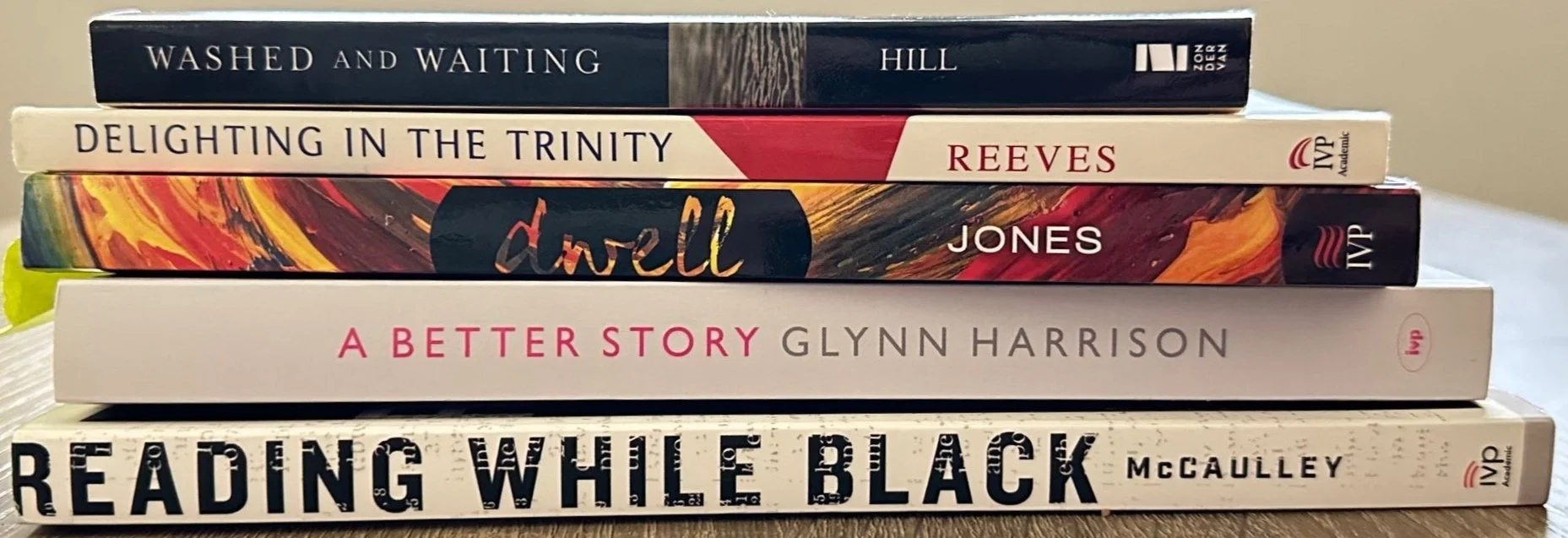Seminary Books for Everyone, II
I've never been a good reader. You can imagine that this has made seminary quite the challenge. 😅
But honestly, two years in, I’m grateful for how much I’ve been formed and challenged through reading. I'm lamenting the ways I fell short as a teacher and minister by not being a better reader over the years.
However, there's no use beating yourself up for the past
when you can quite easily change the present.
So, now I'm a reader. (Or at least trying to be.)
I've read more books in the past two years than I have in my entire life. Many of these books have changed my relationship with Jesus and the way I look at life. (Even the books I've skimmed.)
As I've been reading, I've had this thought. Why didn’t I interact with these ideas sooner?
Sure, there are some academic books that require some technical knowledge to navigate. But the rest should be part of a balanced diet for the church.
Maybe you're a little like me. Maybe you're not a big reader, or maybe you're just not a "theology" reader.
Everyone has thoughts about God; therefore, everyone is a theologian.
So you might as well be an informed theologian.
John Calvin said, "man never achieves a clear knowledge of himself unless he has first looked upon God’s face" (Institutes I.1.2). In other words, if you truly want to know thyself, you have to increase your knowledge of God.
So, from a former non-reader, here are some books I've read in seminary that people who aren't in seminary can (and totally should) read, too.
Reading While Black
The Bible was not written in America, in 2023, to a majority culture. However, we tend to read Scripture as if it were, causing us to apply our own understanding and definitions to what the authors are saying. No one is a neutral reader of Scripture; all of us read with biases, of which we probably aren’t even aware. Our context influences our perspective, which influences our interpretation. Because of this, there’s great value in discussing the text with someone who doesn’t look like you or didn’t grow up like you. Their perspective may highlight things that you’ve never even seen in the biblical text, because they’re looking through a different lens than you. Not “better”, but different, which is good and helpful. In this book, Esau McCauley shares how his perspective as a black man growing up in the South who loved the Bible and culture impacts how he understands Scripture. Solid read.
RetroChristianity
Protestants: we suck at church history. It didn’t start with the Reformation. It started in Acts 2, and our story today is informed by the hits and misses of the Christians in the thousands of years that followed. We tend to forget this, and therefore our theology of the church is pretty shallow. If we want to speak to where the church should go, we need to know where she’s been. This book by Michael Svigel (one of my professors) is a survey of what a historic, apostolic church looks like.
Washed and Waiting
Gay & Christian. Can the two terms coexist? What does each mean for the other? Have I been provocative enough to get you to read a book that might make you uncomfortable? I hope so. Wesley Hill is an Episcopal priest (and former yinzer) who writes on his experience as a gay man who is committed to the sexual ethic of Jesus. This book will break your heart and challenge you.
Lost Letters of Pergamum
In a bit of a creative turn, this book is comprised of fictional letters written as if they come from the time of the New Testament to give you a glimpse into first-century life. In the same way our modern cultural contexts inform our understanding of Scripture, knowing more about the context in which it was written opens up a whole new realm of meaning. If you don’t know much about the background of the New Testament, this is a great place to start.
A Better Story
An incredible analysis and response to the sexual revolution. Glynn Harrison offers great insights on the good the revolution brought about, as well as the ways it has under-delivered. If we want to redeem a culture informed by the sexual revolution, we can’t yell bible verses and statistics at it. We need to listen. We need to tell better stories. God’s vision for human flourishing is much bigger and more beautiful than what the modern perspective has to offer.
BONUS ROUND
Did you miss my list last year? That's probably because I mentioned it in a sermon but never posted about it. So, here are my other recommendations:
Dwell
Great insights on how to live daily life with Jesus. Barry Jones, a pastor and former DTS professor, gives great nuts-and-bolts on how and why we need embodied spirituality. Highly recommended.
Delighting in the Trinity
God’s triune nature, while often taken for granted, is the very basis for life as we know it. Hot take? Maybe, but I’m convinced it’s true. Michael Reeves explains why God existing as three persons with one nature is not just a theological position to take, but the foundation on which all other things rest.
If you choose to read any of these, I hope it challenges you to be more like Jesus. I’d love to hear about it.
Love yall!
Jason
